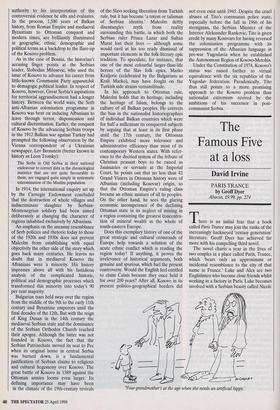The Famous Five at a loss
David Irvine
PARIS TRANCE by Geoff Dyer Abacus, £9.99, pp. 274 There is an initial fear that a book called Paris Trance may join the ranks of the increasingly hackneyed 'ecstasy generation' literature. Geoff Dyer has achieved far more with his compelling third novel.
The novel charts a year in the lives of two couples in a place called Paris, Trance, which 'bears only an approximate or incidental resemblance to the city of that name in France.' Luke and Alex are two Englishmen who become close friends whilst working in a factory in Paris. Luke becomes involved with a Serbian beauty called Nicole `Your grandmother's at the age when she needs an artificial hippy.' and Alex falls for the North-African Sahra. What follows is an in-depth analysis of the two relationships (Luke's is more violent, difficult, Alex's is homely and loving) and their interaction. We see the couples m intimate moments, at parties and in the wild clubland (`The dance floor was crowded, the music pumping') of Paris, Trance. On two occasions the couples sojourn in country houses. At these times especially, one begins to see the protagonists as a New Age Famous Five. Gone are the picnics and lashings of ginger beer — cocaine and rough sex have taken their place. Towards the end they even get a dog to make up the fivesome — but Timmy's cousin is named Spunk. And fun and larks were had by all.
Until, that is, we are given a glimpse of Luke eight years after these halcyon days. When Luke had arrived in Paris, it had been with the intention of writing a novel about his time there. This ambition quickly disappears as a hedonistic striving for some unknown goal takes over. 'He fell for the easy part of the Rimbaud myth,' Alex tells us, 'the prolonged and systematic derange- ment of the senses, but — like many before him — he had none of the discipline or drive of the genuine artist and ended up with nothing to show for it, except what he'd done to himself.' Eight years on, Luke `was still aching after a possible future, some yet-to-be-achieved ideal, some Frowning moment of happiness.' The novel Is at its most interesting as it examines the character of the modern nihilist, an Intelligent man who fails to discover his Purpose or ideal.
The reader may experience some difficulty with the narrative voice. We learn early on that Alex is the narrator. Having noted Luke's failure to write the story, Alex writes, 'it's fallen to me to tell his story, or at least the part of it with which. I am familiar.' Yet the narrator soon becomes omniscient. At times, however, the narrative voice reverts to Alex. It becomes unclear whether we are to attribute certain passages of philosophical reverie to Alex or to the author. Perhaps our perspective is supposed to be blurred, but it is difficult to discern the purpose of this confusion.
Whoever is doing the narrating, the nar- rative suffers from a lack of ironic distance. The story is related with a straight face, almost earnestly. The reader is expected to empathise with the concerns, the japes, the buoyant dialogue, the fashion of the world of these couples, unreflectingly. The lack of narratorial detachment may jar with the reader, and hinders the author in the effort to shift from the individual to the general and to elucidate fully his themes: love, friendship, hedonism, nihilism. Nonetheless Dyer is a deft storyteller. Despite Alex's early claim that his novel 1s not a story, that 'whatever makes events into a story is entirely missing from what follows,' Dyer has written a rattling good tale which will retain the reader's interest and curiosity throughout.



































































 Previous page
Previous page